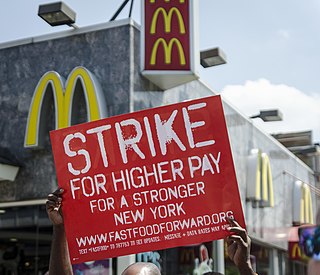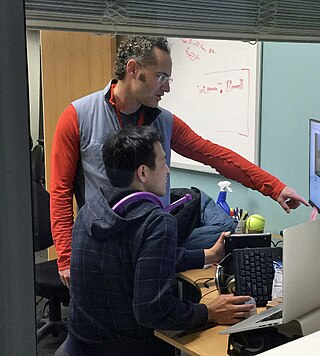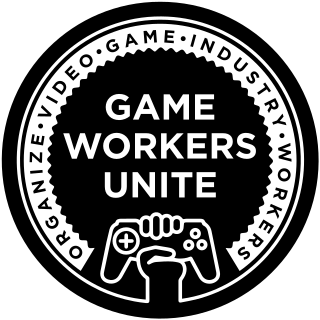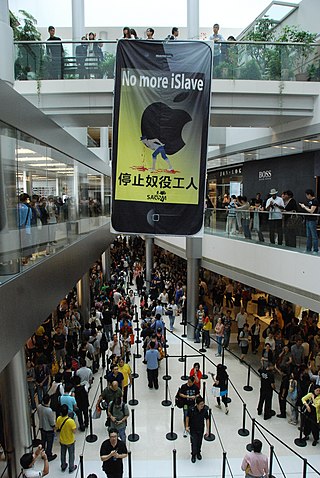Related Research Articles

The nature and power of organized labor in the United States is the outcome of historical tensions among counter-acting forces involving workplace rights, wages, working hours, political expression, labor laws, and other working conditions. Organized unions and their umbrella labor federations such as the AFL–CIO and citywide federations have competed, evolved, merged, and split against a backdrop of changing values and priorities, and periodic federal government intervention.
Palantir Technologies is a public American company that specializes in software platforms for big data analytics. Headquartered in Denver, Colorado, it was founded by Peter Thiel, Nathan Gettings, Joe Lonsdale, Stephen Cohen, and Alex Karp in 2003. The company's name is derived from The Lord of the Rings where the magical palantíri were "seeing-stones," described as indestructible balls of crystal used for communication and to see events in other parts of the world.

The Fight for $15 is an American political movement advocating for the minimum wage to be raised to USD$15 per hour. The federal minimum wage was last set at $7.25 per hour in 2009. The movement has involved strikes by child care, home healthcare, airport, gas station, convenience store, and fast food workers for increased wages and the right to form a labor union. The "Fight for $15" movement started in 2012, in response to workers' inability to cover their costs on such a low salary, as well as the stressful work conditions of many of the service jobs which pay the minimum wage.

Alexander Caedmon Karp is billionaire businessman, and the co-founder and CEO of the software firm Palantir Technologies. As of February 2024, his estimated net worth is US$1.9 billion.

The Never Again pledge or NeverAgain.tech is a commitment by information technology workers to work against a United States government database identifying people by race, religion, or national origin, specifically in response to the Trump presidential campaign statements about creating a Muslim registry and deporting millions of illegal immigrants.

A Day Without a Woman was a strike action held on March 8, 2017, on International Women's Day. The strike, which was organized by two different groups—the 2017 Women's March and a separate International Women's Strike movement—asked that women not work that day to protest the policies of the administration of Donald Trump. Planning began before Trump's November 2016 election. The movement was adopted and promoted by the Women's March, and recommended actions inspired by the "Bodega Strike" and the Day Without Immigrants.

Meredith Whittaker is the president of the Signal Foundation and serves on its board of directors. She was formerly the Minderoo Research Professor at New York University (NYU), and the co-founder and faculty director of the AI Now Institute. She also served as a senior advisor on AI to Chair Lina Khan at the Federal Trade Commission. Whittaker was employed at Google for 13 years, where she founded Google's Open Research group and co-founded the M-Lab. In 2018, she was a core organizer of the Google Walkouts and resigned from the company in July 2019.
The 2018 Google walkouts occurred on November 1, 2018 at approximately 11 am. The walkout had a large number of participants. The employees demanded five concrete changes from the company: an end to forced arbitration; a commitment to end pay inequality; a transparent sexual harassment report; an inclusive process for reporting sexual misconduct; and elevate the Chief of Diversity to answer directly to the CEO and create an Employee Representative. A majority of the known organizers have left the company since the walkout and many continue to voice their concerns. Google agreed to end forced arbitration and create a private report of sexual assault, but has not provided any further details about the other demands.
Tensions between the multinational technology company Google and its workers escalated in 2018 and 2019 as staff protested company decisions on a censored search engine for China, a military drone artificial intelligence, and internal sexual harassment.

Emma Kinema is an American labor organizer and the senior campaign lead of CODE-CWA, the Communication Workers of America's Campaign to Organize Digital Employees. In the late 2010s, while working as a quality assurance tester, Kinema volunteered as a games industry organizer and co-founder of Game Workers Unite. She was hired by the CWA union in 2020 to lead their initiative to organize video game and tech workers, the first American initiative of its kind in those sectors.

Game Workers Unite is a worker-run, labor rights group seeking to organize the video game industry. Founded during events surrounding the March 2018 Game Developers Conference, the flat organization has grown to over a thousand members across more than 20 international chapters. Its goal is a single union for all games workers, including artists, designers, producers, and programmers. Game Workers Unite has supported actions including Riot Games's 2019 walkout over sex discrimination and social media campaigns against CEOs who executed layoffs. The British chapter of Game Workers Unite is legally recognized as a union within the Independent Workers' Union of Great Britain and is working to end crunch overtime practices, improve diversity and inclusion, support targeted workers, and ensure steady and fair wages. Game Workers Unite co-founder Emma Kinema was hired by the Communications Workers of America to organize workers in the high tech and video game industries in early 2020, the first American initiative of its kind in those sectors.

Some warehouse workers of Amazon, the largest American e-commerce retailer with 750,000 employees, have organized for workplace improvements in light of the company's scrutinized labor practices and stance against unions. Worker actions have included work stoppages and have won concessions including increased pay, safety precautions, and time off. There are unionized Amazon workers in both the United States and Europe.
A tech union is a trade union for tech workers typically employed in high tech or information and communications technology sectors. Due to the evolving nature of technology and work, different government agencies have conflicting definitions for who is a tech worker. Most definitions include computer scientists, people working in IT, telecommunications, media and video gaming. Broader definitions include all workers required for a tech company to operate, including on-site service staff, contractors, and platform economy workers.

Alphabet Workers Union (AWU), also informally referred to as the Google Union, is an American trade union of workers employed at Alphabet Inc., Google's parent company, with a membership of over 800, in a company with 130,000 employees, not including temps, contractors, and vendors in the United States. It was announced on January 4, 2021 with an initial membership of over 400, after over a year of secret organizing, and the union includes all types of workers at Alphabet, including full-time, temporary, vendors and contractors of all job types.

The Campaign to Organize Digital Employees or CODE-CWA is a project launched by the Communications Workers of America to unionize tech and video game workers in January 2020. It sprung out of conversations with Game Workers Unite (GWU) and employed at least two full time staff, including GWU co-founder Emma Kinema and veteran SEIU organizer Wes McEnany. In 2022, Jessica Gonzalez joined, a former Activision Blizzard QA tester.
Trade unions have historically been unrecognized by IBM. Since the company's foundation in 1911, it has not recognized any in the United States, despite efforts by workers to establish them from 1970 onward. In Australia, Germany and Italy, several trade unions have limited recognition from IBM. IBM has been able to minimize membership even in traditional union strongholds in Western Europe.

Apple Inc. workers around the globe have been involved in organizing since the 1990s. Apple worker organizations have been made up of retail, corporate, and outsourced workers. Employees have joined trade unions and formed works councils in Australia, France, Germany, Italy, Japan, United Kingdom and the United States.

Cher Scarlett is an American workers' rights activist, software engineer, and writer. She has organized staff at Apple, Activision Blizzard, and Starbucks.

Liz Fong-Jones is a site reliability engineer and developer advocate known for labor activism with her contributions to the Never Again pledge and her role in leading Google worker organization efforts. She is the president of the board of directors of the Solidarity Fund by Coworker, which she seeded with her own money. She is Honeycomb's field Chief Technology Officer.
Jessica Gonzalez is an American labor organizer working with CODE-CWA, the Communication Workers of America's Campaign to Organize Digital Employees. She is known for her work organizing in the video game industry and founding A Better ABK, the worker advocacy group at Activision Blizzard, and co-founding ABK Workers Alliance, a solidarity union, and Game Workers Alliance, the Raven Software union.
References
- 1 2 3 4 5 Weigel, Moira (October 31, 2017). "Coders of the world, unite: can Silicon Valley workers curb the power of Big Tech?". The Guardian . ISSN 0261-3077. Archived from the original on November 15, 2019. Retrieved November 27, 2019.
- ↑ Woodman, Spencer (January 13, 2017). "Tech workers are protesting Palantir's involvement with immigration data". The Verge . Archived from the original on November 14, 2019. Retrieved November 27, 2019.
- ↑ Paul, Kari (May 13, 2019). "Tech workers protest data mining firm Palantir for role in immigrant arrests". The Guardian . ISSN 0261-3077. Archived from the original on October 5, 2019. Retrieved November 27, 2019.
- ↑ Kelly, Heather (May 1, 2017). "May Day protests put spotlight on tech's other immigrant workers". CNNMoney . Archived from the original on September 25, 2019. Retrieved November 27, 2019.
- ↑ Paulas, Rick (September 4, 2018). "A New Kind of Labor Movement in Silicon Valley". The Atlantic . Archived from the original on November 12, 2019. Retrieved November 27, 2019.
- ↑ Harnett, Sam (July 7, 2018). "In a Direct Challenge to Their Employers, Tech Workers Begin to Organize". KQED . Archived from the original on November 15, 2019. Retrieved November 27, 2019.
- ↑ Conger, Kate; Scheiber, Noam (July 8, 2019). "Employee Activism Is Alive in Tech. It Stops Short of Organizing Unions". The New York Times . ISSN 0362-4331. Archived from the original on November 23, 2019. Retrieved November 27, 2019.
- ↑ Matsakis, Louise (September 20, 2019). "Thousands of Tech Workers Join Global Climate Change Strike". Wired . ISSN 1059-1028. Archived from the original on October 13, 2019. Retrieved November 27, 2019.
- 1 2 Asher-Schapiro, Avi (March 6, 2019). "Move Fast and Build Solidarity". The Nation . ISSN 0027-8378. Archived from the original on November 27, 2019. Retrieved November 27, 2019.